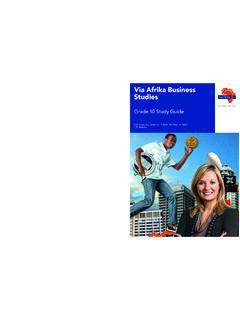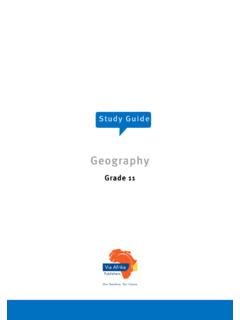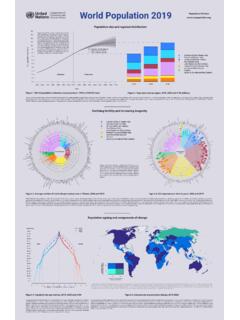Transcription of Via Afrika Economics
1 Via AfrikaEconomicsGrade 10 Study GuideC. Chaplin Via Afrika EconomicsContentsIntroduction to Economics ..vTopic 1 What is Economics ? ..1overview ..1 Unit 1 Basic concepts ..2 Unit 2 The methods of Economics ..4 Unit 3 The settling of Economics within the field ..6 Questions ..7 Topic 2 The basic economic problem ..9overview ..9 Unit 1 The problem of scarcity ..10 Unit 2 Production, exchange and consumption ..12 Unit 3 Sustainable development and human rights ..15 Questions ..16 Topic 3 Circular flow and quantitative elements ..18overview ..18 Unit 1 The participants in the economy ..19 Unit 2 Markets ..22 Unit 3 Deriving GDP ..24 Unit 4 Deriving gross national income ..26 Unit 5 Comparing GDP and GNI.
2 27 Questions ..28 Topic 4 Business cycles ..30overview ..30 Unit 1 The phenomenon of business cycles ..31 Unit 2 Ways of representing business cycles ..33 Unit 3 Reasons for business cycles ..38 Unit 4 Effects of business cycles ..41 Unit 5 Effects on people who are economically vulnerable ..42 Questions ..44 Topic 5 The dynamics of markets ..46overview ..46 Unit 1 The market as a phenomenon ..47 Unit 2 Types of markets ..49 Unit 3 Why prices are important in the market ..51 Unit 4 Demand, supply and price ..52 Via Afrika EconomicsContentsUnit 5 Supply and price ..54 Unit 6 Price formation ..56 Unit 7 Functions of markets ..58 Questions ..60 Topic 6 The production possibility curve ..62overview ..62 Unit 1 Resource allocation.
3 63 Unit 2 Maximising satisfaction indifference curves ..66 Unit 3 Market failures inefficiencies ..67 Questions ..69 Topic 7 The public sector ..72overview ..72 Unit 1 Reasons for public sector intervention ..73 Unit 2 Kinds of ..78 Topic 8 Growth, development and globalisation ..80overview ..80 Unit 1 The emergence of trade ..81 Unit 2 Evolution of markets ..82 Unit 3 Governments and the regulation of markets ..84 Unit 4 Industrial development ..85 Unit 5 economic institutions ..86 Questions ..87 Topic 9 South African economic growth and development ..89overview ..89 Unit 1 Animal husbandry and agriculture ..90 Unit 2 Agriculture and mining ..92 Unit 3 Mining and industry: 1910 to 1990s ..94 Unit 4 Manufacturing and services: since 1990.
4 97 Questions ..100 Topic 10 The history of money and banking in South Africa ..101overview ..101 Unit 1 The history of money ..102 Unit 2 The history of banking in South Africa ..104 Via Afrika EconomicsContentsUnit 3 The South African Reserve Bank ..106 Unit 4 Recent trends in banking ..107 Questions ..108 Topic 11 population and labour force trends ..110overview ..110 Unit 1 The population of South Africa ..111 Unit 2 The South African labour force ..114 Questions ..116 Topic 12 Unemployment ..117overview ..117 Unit 1 The nature of unemployment ..118 Unit 2 Approaches to solving the problem of unemployment ..123 Unit 3 Economically marginalised groups ..125 Questions ..127 Topic 13 Labour relations ..128overview.
5 128 Unit 1 The labour market in South Africa ..129 Unit 2 The objectives of the Labour Relations Act ..133 Unit 3 Labour rights and conventions ..135 Unit 4 Collective bargaining and dispute resolution ..137 Unit 5 Labour Courts ..139 Questions ..140 Topic 14 economic redress ..142overview ..142 Unit 1 Meeting basic needs ..143 Unit 2 Human resources ..144 Unit 3 Natural resources ..146 Unit 4 Capital ..148 Unit 5 Entrepreneurship ..150 Unit 6 Democratisation of economic procedures ..152 Unit 7 Macroeconomic adaptations ..154 Questions ..157 Exam Papers ..159 Answers ..167 Glossary ..179 Via Afrika EconomicsvIntroduction to Economics Via Afrika EconomicsvWhy is Economics important? Economics is an exciting and interesting subject to study because it touches every area of your life.
6 There is nothing that you do that is not related to Economics . We all make economic decisions every day of our lives, and Economics can help to improve our decision-making. Economics offers a way of thinking about the world that enables us to make the best of what we have. In your Economics studies this year, you will look at major challenges in South Africa, such as unemployment and poverty. You will gain insight into how our government makes plans and policies to deal with issues such as these. Economics not only provides you with the knowledge and insight necessary to understand the impact of developments in business, society and the world economy, but it also helps you to understand the decisions of households, firms and governments.
7 Economics is about choice, scarcity, opportunity, and the impact of decision-making on aspects of is concerned with understanding how society sets about meeting people s demands for things they want to consume. It also compares alternative ways of using the limited resources that countries and individuals possess and considers how efficient and/or fair such alternatives are. You will find it interesting to compare how different countries solve the problem of limited also relates to a whole range of other subjects. Economics is closely related to history because in order to have a good understanding of how economies function, it also helps to be able to see economic problems in their historical context and how economic ideas have developed over time.
8 Other subjects that are closely related to Economics include business studies, human geography and psychology. To be able to analyse economic problems, you will use a number of techniques. Some of these are mathematical and/or studying early for your exams! This study guide is designed to help you with your final revision before exams. It will take you through the text book with which you are working and also gives you practice examples, exam papers and answers. It does not replace your text book. The study guide will give you: sample exam questions and answers an overview of each module Via Afrika Economicsvi a review of the main concepts in each module practice use the exams and questions to get a feel for the style of the questions you might be is a dynamic and worthwhile field of study because it deals with important and interesting subjects such as capitalism versus socialism, management of inflation and unemployment, economic development of poor countries, pollution and many specific government policies, such as deregulation of electricity, the minimum wage, agricultural price supports, and rent control.
9 Enjoy your studies! UnitXXUnitXX Via Afrika Economics1 What is Economics ?Topic1 OverviewWhat is Economics ?TOPIC 1 Page 1 economic models and theories positive and normative statementsUNIT 2 Page 4 Economics as a social science relationship to other sciences and career opportunitiesUNIT 3 Page 6 Branches of Economics international, monetary, public, development, labour and environmentalUNIT 1 Page 2 The difference between micro- and macro-economicsDifficulties faced by economistsTypes of economic systems: Traditional, command, market and mixedEconomic questions and decisions: What, how and by whom?The economic problemScarcity, limited means and unlimited wants Topic 1 looks at the basic concepts or ideas that you will encounter in the study of Economics .
10 It is important that you be familiar with these concepts because they will be used a lot during your studies. You also need to understand how Economics is studied by economists and how it relates to other branches of Via Afrika Economics2 Unit1 Basic Basic concepts Economics is the study of how individuals, businesses, governments and other organisations within our society choose to use scarce resources to satisfy their unlimited wants and needs. Resources are limited so we need to know how to work with them without wasting them. Because we cannot satisfy all our wants and needs, we have to make choices about which needs to satisfy and which not. The economic problem THE BASIC economic PROBLEM is scarcity: the problem arises because resources are scarce, but human wants are unlimited.
















